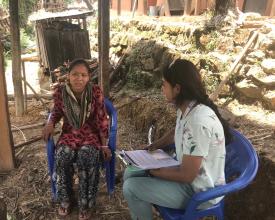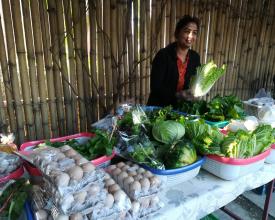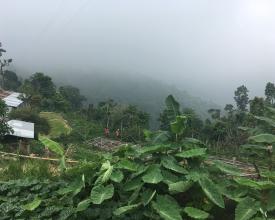
Relier les agriculteurs biologiques de facto mais non certifiés aux marchés urbains en expansion
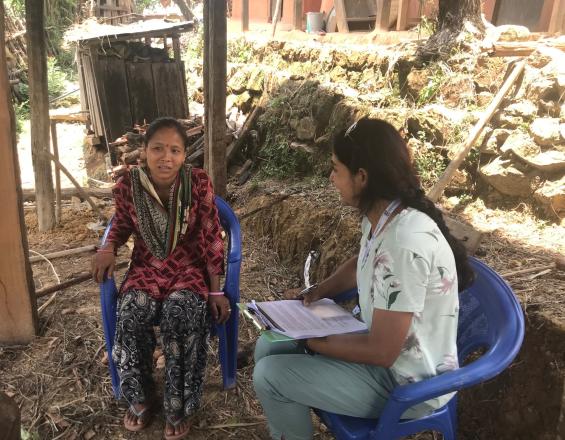
Himalaya Organic Garden, une ferme biologique intégrée située près de Katmandou, produit des légumes, des salades et des produits laitiers biologiques depuis plus de six ans. Elle cultive ses propres produits, conçoit sa propre marque et vend ses produits sur les marchés de producteurs qu'elle a elle-même créés. La pratique de la production biologique est une aubaine pour le maintien de la biodiversité, car elle est exempte de pesticides chimiques nocifs. Récemment, avec le soutien de Rare, la ferme s'est étendue au village de Jasrame, dans le district d'Arghakhachi, à l'ouest du Népal. Depuis des générations, la majorité des agriculteurs sont de facto des producteurs biologiques. Toutefois, faute de certification et d'accès aux marchés, ils n'ont pas encore été en mesure d'exploiter le marché urbain croissant des produits biologiques. En soutenant les agriculteurs dans la production, la certification et l'établissement de marchés de producteurs dans les zones urbaines voisines, Himalaya Organic Garden les aide à exploiter pleinement leur potentiel.
Contexte
Défis à relever
Transport : Les familles de Jasrame cultivent de petites parcelles, les produits ne sont donc pas en vrac. De plus, tous les légumes, fruits et autres cultures sont saisonniers. Pour transporter les produits de valeur jusqu'au marché, les systèmes doivent être bien coordonnés.
Faire correspondre l'offre et la demande : Il est difficile de convaincre de nouveaux clients de cette nouvelle source d'aliments cultivés localement et biologiquement. La confiance ne s'établit pas facilement. Il est donc nécessaire de mener des campagnes et de faire de la publicité pour les rassurer.
Concurrence sur le marché : Le marché local dépend principalement des légumes et des fruits indiens. Les vendeurs gardent le marché sous leur emprise et ne laissent donc pas facilement les agriculteurs locaux proposer des produits biologiques, car cela est perçu comme une menace.
Emplacement
Traiter
Résumé du processus
Les éléments constitutifs représentent les phases de l'initiative "De notre ferme à vous". La première phase encourage les ménages à passer d'une agriculture biologique de fait à une agriculture biologique commerciale. En plus de leurs cultures régulières et de leurs légumes, ils commencent à produire des cultures à haute valeur ajoutée. Au cours de la deuxième phase, une équipe est constituée pour favoriser l'expansion du marché, en s'adressant aux zones urbaines proches ainsi qu'aux grandes villes. L'équipe trouve une et/ou deux zones appropriées pour établir des marchés de producteurs, soit dans un lieu public, soit sur un terrain privé (hôtel/restaurant/centre commercial). La ville sub-métropolitaine sert de médiateur entre les deux parties pour organiser un marché de producteurs une et/ou deux fois par semaine. Dans la troisième phase, l'équipe s'occupe de la collecte, du transport et de la vente des produits sur le marché de producteurs, ainsi que dans la capitale.
Blocs de construction
Mise en place d'une chaîne de valeur pour les petits exploitants isolés
Les terres vallonnées productives, entourées de forêts vertes (habitat des animaux sauvages) et les agriculteurs intéressés par le passage à l'agriculture biologique commerciale sont une aubaine pour notre initiative. Les cultures courantes, les fruits et les légumes tels que le maïs, le millet, le sarrasin, le chou-fleur, la tomate, le curcuma, le fruit du jacquier, la mangue, etc. seront encouragés à augmenter en volume. Des cultures à haute valeur ajoutée telles que le kiwi, l'avocat, les graines de chia et le moringa seront également introduites au cours de la deuxième phase. Ces produits seront directement reliés aux zones urbaines les plus proches par le biais de marchés fermiers organisés une ou deux fois par semaine. Par conséquent, le lien direct entre les produits biologiques des agriculteurs locaux et les consommateurs par l'intermédiaire des marchés de producteurs permettra d'établir une relation de confiance et une relation positive.
Facteurs favorables
Le soutien apporté par IFOAM - Organics International et Rare sous la forme de formations pratiques a motivé la communauté et accru l'intérêt pour l'agriculture biologique commerciale. La mise en relation de ces agriculteurs biologiques de facto avec les marchés leur permettra de passer à l'agriculture biologique commerciale, ce qui favorisera la création de revenus tout en préservant l'écologie.
Leçon apprise
Je constate que la communauté est très enthousiaste à l'idée d'améliorer son statut par le biais de l'agriculture biologique commerciale, tout en préservant la biodiversité. L'établissement de liens personnels et la mise en place d'une communication interpersonnelle sur l'agriculture biologique à l'aide de divers outils attrayants tels que des chansons, des panneaux d'affichage, des pièces de théâtre et des textes religieux ont contribué à inspirer la communauté.
Créer une demande de produits biologiques sur les marchés domestiques et urbains en développement
Les consommateurs des zones urbaines ont aujourd'hui un besoin urgent de légumes et de cultures biologiques cultivés localement. Le fait de rendre ces produits facilement disponibles sur les marchés de producteurs incitera davantage de consommateurs à les visiter et à les acheter. Par conséquent, l'augmentation du nombre de consommateurs sur le marché crée une demande accrue pour les produits locaux, frais et biologiques, ce qui incitera finalement les agriculteurs à produire davantage de légumes, de fruits, de céréales et de lentilles.
Facteurs favorables
-
la popularité croissante de la consommation de produits biologiques dans les zones urbaines du Népal
-
l'intérêt croissant pour les "super-aliments" sains tels que les produits à base d'avocat et de moringa
-
La volonté des ménages de Jasrame de répondre à la demande dans les villes voisines et dans la capitale.
Leçon apprise
-
L'augmentation du nombre de consommateurs d'aliments sains, je l'ai moi-même expérimentée dans notre capitale, Katmandou, ainsi que dans les principales zones urbaines du pays.
-
Grâce à des recherches basées sur des enquêtes sur les connaissances, les attitudes et les pratiques, j'ai appris que la grande majorité (plus de 95 %) des petits exploitants agricoles de la zone d'intervention étaient déjà biologiques de facto, mais qu'aucun d'entre eux n'avait pris de mesures pour obtenir une certification et s'implanter sur les marchés urbains.
Renforcement des capacités des producteurs biologiques de facto mais non certifiés
Les producteurs seront régulièrement formés aux BPA (bonnes pratiques agricoles) et aux BPF (bonnes pratiques de fabrication) et recevront des cours de motivation pour passer à l'agriculture biologique et pratiquer toutes les activités en groupe.
L'application d'une méthode biologique pratique est importante pour les producteurs biologiques, car elle permet de minimiser le temps et d'augmenter les produits. La formation à la plantation, à la récolte, à l'emballage, au marquage, au marketing, etc. (dans le cadre des BPA et des BPF) améliorera la qualité des agriculteurs.
Facteurs favorables
-
Mon expérience en tant que consultant en jardinage sur les toits, militant pour l'agriculture biologique, formateur et agriculteur biologique.
-
L'enthousiasme manifesté par les ménages de Jasrame à la suite de nos formations initiales.
Leçon apprise
-
Le changement que j'ai constaté chez les stagiaires après avoir partagé mes idées et les avoir encadrés dans les domaines de l'agriculture biologique, de l'emballage et de l'image de marque.
-
Le reflet de la diffusion des connaissances par IFOAM - Organics International dans les ménages de Jasrame.
Impacts
L'agriculture biologique nous soutient de trois manières : socialement, économiquement et écologiquement.
L'agriculture biologique est une forme d'agriculture traditionnelle dans laquelle aucun pesticide chimique n'est utilisé. La méthode d'agriculture traditionnelle favorise une relation harmonieuse avec la nature et nécessite des ressources humaines pour tous les processus, de la plantation à la récolte. Traditionnellement, au Népal, les travaux des champs étaient effectués en commun. L'agriculture en commun était une plateforme d'échange des forces de travail, des peines et des joies, ce qui favorisait l'harmonie sociale. Le rétablissement de ce type d'agriculture rétablira l'harmonie entre les membres de la communauté.
Les terres écologiquement douées du district d'Arghakhanchi ont un fort potentiel de rendement. Ce potentiel s'accompagne d'une forte demande et de capitaux sur le marché urbain voisin. Ainsi, la sensibilisation, la formation et le soutien à la commercialisation au sein de la communauté encourageront tous les ménages à cultiver des produits à plus forte valeur ajoutée, tels que l'avocat, le kiwi, le moringa et les graines de chia. Ainsi, les ménages deviennent eux-mêmes producteurs et vendeurs de leurs propres produits sur les marchés, ce qui aidera la communauté à établir des modes de vie économiquement sains et résistants.
La production biologique et les marchés appropriés incitent les producteurs à poursuivre dans la même voie.
Bénéficiaires
Sous la devise "De notre ferme à vous", plus de 100 agriculteurs locaux et à petite échelle ainsi que 500 bénéficiaires indirects sont aidés par l'initiative.
Objectifs de développement durable
Histoire
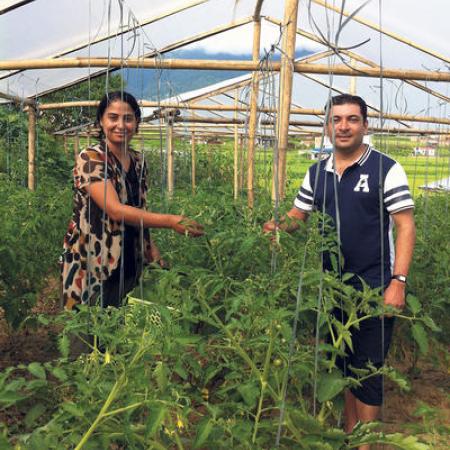
Après avoir perdu ma mère, atteinte d'un lymphome au cerveau, j'ai commencé à rechercher les causes du cancer. L'utilisation de produits chimiques et de pesticides dans l'alimentation est apparue comme l'une des principales raisons. J'ai appris que les légumes que nous consommions étaient cultivés avec des engrais chimiques et des pesticides. De même, je me suis rendu compte que nous invitions certaines maladies à travers notre alimentation. Nous avons commencé à nous aventurer dans différents coins de la vallée de Katmandou à la recherche de légumes cultivés de manière biologique. Nous en avons trouvé peu et ils étaient en nombre limité.
Après cette recherche frustrante, j'ai commencé à cultiver quelques légumes et salades biologiques sur mon propre toit. Cela m'a encouragé à en cultiver davantage afin de pouvoir les partager avec d'autres personnes intéressées par le bio. À ce moment-là, j'avais presque abandonné ma petite entreprise d'importation.
Lorsque j'ai finalement acheté une terre agricole, c'était une terre stérile, remplie d'herbe, dans un nouvel endroit, dans une banlieue inconnue. Je me souviens parfaitement de ces jours difficiles : La saison des moussons, les jours de pluie, le manque d'argent et d'idées. Mon mari, enseignant, ne pouvait m'aider que l'après-midi, car il avait cours le matin.
L'internet était mon école : J'ai surtout surfé pour faire des recherches sur des sujets vastes et peu familiers : Plantation, semis, récolte et autres.
Peu à peu, mes produits ont pris de l'ampleur et j'ai dû me mettre à la recherche de marchés : Des grands magasins aux mini-marchés bio. Plus tard, j'ai également géré mon propre point de vente. Aujourd'hui, les clients se rendent dans ma ferme pour acheter. Deux fois par semaine, nous, agriculteurs biologiques de Katmandou, organisons un marché fermier où nous vendons des salades, des légumes, des produits laitiers, des œufs locaux, des céréales, des lentilles et bien d'autres choses encore.
On m'a également offert la possibilité de fournir des services en tant que consultant pour l'agriculture sur les toits dans le centre-ville de Katmandou auprès de 25 ménages différents.
Actuellement, je suis plus impliquée dans la production de nouvelles variétés d'herbes, de salades, de fruits et autres. Je développe également ma ferme pour qu'elle serve de centre d'apprentissage pour les jeunes enfants et de centre de recherche pour les étudiants de niveau supérieur. Quelques groupes de femmes ont été créés dans ma banlieue sur la base de mon initiative.
D'une parcelle stérile, ma ferme s'est transformée en un lieu dynamique de discussion, d'observation et d'innovation en matière d'agriculture biologique, de moyens de subsistance et de durabilité.
